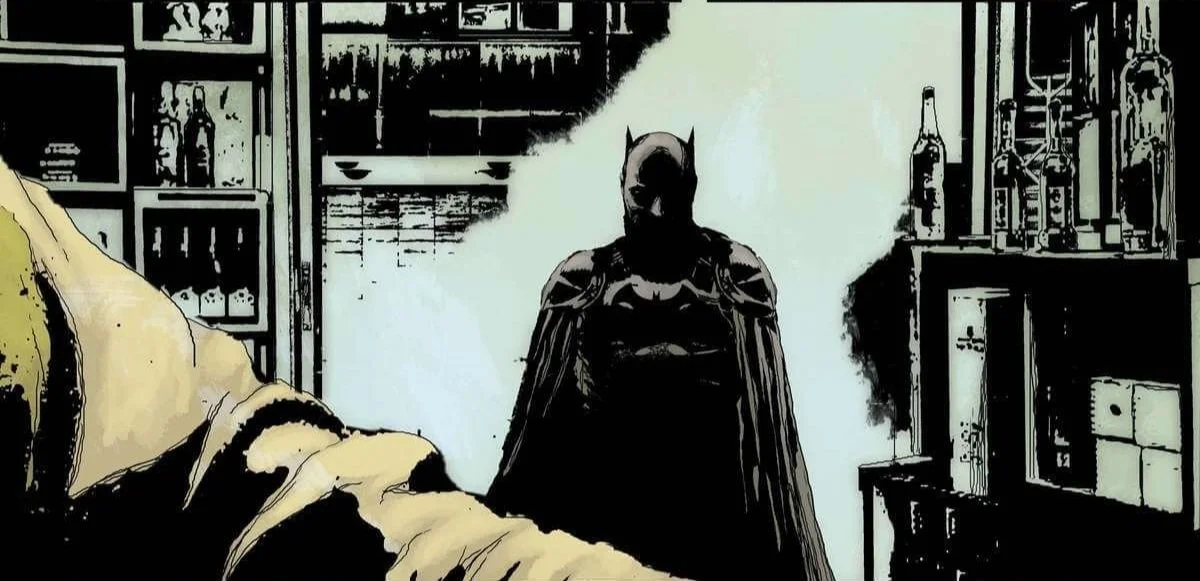Writer: Mattson Tomlin / Penciller: Andrea Sorrentino / Colour Artist: Jordie Bellaire / Letterer: Steve Wands / Collects: Batman The Imposter #1-#3 / HC / DC Comics
Buy Batman: The Imposter here. Get more Batman comics here. Buy DC Comics here. Every purchase supports The Comic Crush.
Check out our reviews of The Batman. Spoiler-free or Spoiler-filled!
20th March 2022 (Released: 22nd February 2022)
The Pitch: Bruce Wayne’s mission as the Batman has only been underway for a year or so, but he can tell he’s making a difference. Unfortunately, he’s made some powerful enemies. All the traditional power brokers of Gotham resent the disruption the Batman has brought to town…and it seems one of them has a plan to neutralize him. There’s a second Batman haunting Gotham’s rooftops and alleys—and this one has no qualms about murdering criminals, live and on tape. With the entire might of the Gotham City Police Department and Gotham’s rich and powerful coming down on his head, Batman must find this imposter and somehow clear his name…but how can you prove your innocence from behind a mask?
We all require different things from different superheroes. For those of us that like Superman, it might be the endless optimism combined with the sheer mountain-shaking strength. The benevolent God. For some, it's Hal Jordan's force of will. For me, it's Batman's capability and, as weird as this may sound, his believability. I'm one of those irritating people who like this particular character a little more grounded. As comic-book heroes go, he's the one that most benefits from having the weight of the real placed upon the shoulders of his world, if not his choices and motivations. This is an important distinction for this book. I'm not sure how many of us would strap on armour and a cape to fight crime, regardless of how violently our family members left this mortal coil. To be clear, I don't want Batman to be realistic. I just want it to have realism. I want him to exist in a world that supports his decisions. With the new Batman film wearing its grit proudly, I should have expected its originator, Mattson Tomlin would create a grounded, believable Batman for the modern era.
tomlin builds by stripping away - there’s no gordon,no alfred
I can’t remember how I felt about the first issue of this book, back when we reviewed it in 2021. This time around, I found it Interesting how Tomlinson builds by stripping away. Despite the fact that we’re in the early years of Batman’s war on crime, there's no Jim Gordon and no Alfred, so Bruce's support network is gone. Gordon, in a realistic response, has been run out of Gotham for his association with the vigilante. Alfred appears to have died in the early days of Bruce's crusade. So that leaves us with a man alone. Or rather, a lonely boy, who desperately needs help. He finds this in the book's early pages, with therapist Leslie Thompkins, who discovers Bruce's secret and threatens to expose him unless he arrives at her place before dawn every day and undergoes therapy. It's an interesting bargain and one that addresses the (somewhat ridiculous) notion that Batman would be a better person if he just talked to someone. Personally, I disagree. If he starts sharing his feelings, he wouldn't be Batman. The interior life is what makes him who he is – or at least part of it. So it's to Tomlin's credit that he makes it work. Also, there is a sense that therapy could be used to excuse the violence. If indeed you agree that what Bruce is doing is wrong. He’s effectively still alone in his mission. Until he isn't. Joined by an uninvited, shadowy reflection of Batman he’s forced to examine his methods and reasoning. An extreme therapy to work alongside his ‘proper’ therapy. A Batman who kills, negating Bruce's prime directive turns the real Batman into hunted game for the GCPD.
this is beautifully constructed, often pairing bruce and alyssa’s investigations
Tomlin and Sorrentino pack a lot into this book. It's beautifully constructed, often paralleling Bruce's investigation into his homicidal mirror with that of Alyssa Wong, a detective looking into the killings supposedly committed by The Batman, follows the money (Like Ra's al Ghul back in the day when he discovered Batman's true identity), and finds Bruce Wayne, the lonely boy who needs help. Their mutual investigation of each other turns into a real love affair, one that at first seems false, simply because as the reader, we know their true desires. Bruce wants to know what the police know. Alyssa wants to find out if Bruce is more than he appears to be. It's a marked difference for Bruce. By his own admission in later Batman stories, he loves a bad girl. In a sense, Alyssa is keeping up with that tradition, in that she wants to put him in jail – if he is, indeed the Batman. But at least there's no evil plan at work. She isn't Poison Ivy or Jezebel Jet. Their relationship is one of the most pleasing things about The Imposter. In fact, Alyssa gives us one of the better police viewpoints in a bat-book for a good long while. Her investigation feels real, vulnerable to the pressures put on her by Gotham's wealthy industrialists. In this realism-based milieu, I found myself wondering if this would feel of a piece with Sorrentino’s last Batman work, the excellent, creepy Joker: Killer Smile.
Sorrentino takes a little of bermejo’s velcro strapped batman and JH Williams’ panel weaving to create a style all his own
Construction is a key thing here. We get the sense of a changing Gotham, not just its facades, but its deeper inner workings. Sorrentino's art is constructed, too. He seems to be taking a little of Lee Bermejo's military edges and velcro straps and mixing it with J.H. William's panel weaving, bringing it all to bear in a style all his own. He doesn't feel the need for Bermejo's and Williams' organics. His panels feel like the snapshots you find paper-clipped to police files. You get the relentless thrum of the engine of Batman's bike, the doom he represents for those that break the law and do others harm. This Batman is a machine built to take out the trash. Bellaire colours by almost not colouring, sometimes using a single tone against black and white, '80s newspaper like images created by Sorrentino to slam the emotion home. Wands controls the shifting narration and viewpoints like the master he is, making everyone distinct in their voice and tone. As with Batman: The Detective (which we reviewed a short while ago), The Imposter presents the notion that Batman is the problem, but does so in a more reasoned, real manner. It’s fascinating that Batman books are at least attempting to grapple with the socio-political criticisms levelled at them by readers, although I’ll state once more that I find this argument somewhat pointless in fictional worlds. There’s that distinction I mentioned - that the world the characters inhabit must support their reasoning and decision, not ours. The Imposter is an intriguing Elseworlds book without the historical eccentricities and deserves a place in modern Batman history as one of the best in years. Petition DC now for a series set in this universe created by this team. They're the real deal.
Buy Batman: The Imposter here. Get more Batman comics here. Buy DC Comics here. Every purchase supports The Comic Crush. Check out our reviews of The Batman. Spoiler-free or Spoiler-filled!




